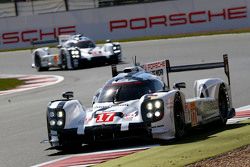Analysis: Why F2 could be Volkswagen's perfect way into F1
Volkswagen boardroom politics seem to have made the Group's entry into Formula 1 more likely, but the in-development F2 series could make an ideal staging post, as Kate Walker explains.

Photo by: Satoshi Noma













Formula 1 is currently at a tipping point, and the outcome could yet be determined in a boardroom in Wolfsburg, Lower Saxony.
If the resignation of Volkswagen chairman Ferdinand Piech triggers the Group’s entry into F1, the arrival of another new manufacturer will be a victory for those who have supported the new hybrid power units in the face of constant criticism from the commercial rights holder.
FIA president Jean Todt has come under a lot of flak for the introduction of 2014’s new V6 turbo power units, but a major factor behind the switch to the hybrid formula was the desire - which soon became a need in the wake of the 2008 financial crisis - to entice more manufacturers into the sport.
Making the engines more road relevant would broaden F1’s appeal in automotive boardrooms, and to that end a working group which included manufacturers not currently active in the sport was formed.
VW was a member of that group, and helped decide on the 2014 power unit regulations, but refrained from adding F1 to its already hefty roster of motorsport commitments: twin LMP1 programmes with Porsche and Audi in WEC, a WRC effort, DTM, GTs and so on.
WRC paying off
In 2012, VW motorsport director Jost Capito said that the Group's WRC entry meant that any potential F1 foray was very much on the backburner.
“I've got my hands full with the WRC right now and we have to focus on that,” he said. “This is the very much the main motorsport programme for us and the board is watching it very closely. I think that's what we have to deliver."
It is safe to say that the delivery has been effective, as VW scooped both drivers' and manufacturers' titles in its first full season in 2013, before claiming the top three slots in the drivers’ standings last year.
With that obstacle out of the way and Audi and Porsche taking points off each other in the battle for WEC supremacy against Toyota and now Nissan, the time has come to reassess the value of keeping both brands in one championship versus moving Audi to F1.
The final obstacle has long been the acrimonious relationship between Piech and Bernie Ecclestone, but speaking to the BBC last week the latter volunteered to resign if his presence at the helm of the sport was keeping VW out. When this weekend’s boardroom battle led to Piech resigning, Ecclestone’s pre-emptive offer looked like something of a masterstroke.
Fewer obstacles, but still a long way to go
Whatever obstacles have been removed, however, it is by no means certain that F1 is Audi’s primary area of interest. Instead, the automotive giant may be giving its attention to a series not yet in existence, but in development: Formula 2.
Recent Audi recruit Stefano Domenicali is also the president of the FIA’s Single-Seater Commission, and in that role the former Ferrari boss is continuing with predecessor Gerhard Berger’s efforts to streamline the motorsport career ladder into a series of logical, cost-effective categories from F4 up to F1.
The future F2 championship is still very much a work in progress, and the engine regulations have yet to be laid down. But it is known that Domenicali favours a hybrid turbo which will allow F2 graduates to make the step up to F1 as part of a logical progression in technology as well as power and speed.
Asked for his personal opinion on whether F2 should be a turbo-powered, smaller-engined formula, Domenicali was clear.
“We need to be pragmatic,” the Italian said at the Silverstone WEC round earlier this month. “We are all motorsport fans, but at the end of the day, the right displacement for the future is smaller. Turbo is the future; hybrid technology is the future; now we have to go back to the level of cost that the system is able to accept.”
It has yet to be determined whether F2 will attract enough manufacturers to create truly open competition, or whether the series will be open in regulation yet spec in the limited options available.
“The biggest challenge is how we will cope with the F2 project in order to be in the middle of F3 and F1,” Domenicali continued.
“We are open to all the different situations. We are discussing with all the different manufacturers of engines and chassis and so on and as you know, we need to go official with a tender to see what will be the real interest of the major stakeholders.”
F2 engines the perfect solution
Over the years, rumours of VW entering F1 have run the gamut from a full-blown works outfit to simple engine supply.
Should the Wolfsburg board wish to dip its toe in the waters of F1 engine supply, developing F2 engines using tech similar to that which has proved so troublesome to perfect at the highest level could be the ideal solution.
With lower costs the objective, fewer restrictions on testing a prospective unit for rules not yet written, and existing in-house expertise, Audi might find F2 a very attractive, lower profile rehearsal space for a future push into F1.
If Domenicali’s work on F2 has the added bonus of providing the VW Group with an easy way into F1, in one fell swoop Jean Todt will be able to tick off three key objectives of his presidency: increased manufacturer involvement, a streamlined motorsport career path, and a reduction in the expense of making it to the top tier of single-seater motorsport.
All that remains is to reduce the cost of competition...
Be part of Motorsport community
Join the conversationShare Or Save This Story
Subscribe and access Motorsport.com with your ad-blocker.
From Formula 1 to MotoGP we report straight from the paddock because we love our sport, just like you. In order to keep delivering our expert journalism, our website uses advertising. Still, we want to give you the opportunity to enjoy an ad-free and tracker-free website and to continue using your adblocker.















Top Comments